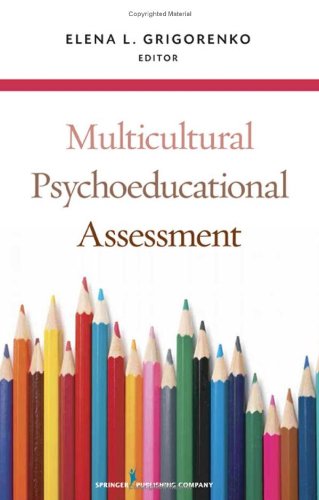

Most ebook files are in PDF format, so you can easily read them using various software such as Foxit Reader or directly on the Google Chrome browser.
Some ebook files are released by publishers in other formats such as .awz, .mobi, .epub, .fb2, etc. You may need to install specific software to read these formats on mobile/PC, such as Calibre.
Please read the tutorial at this link. https://ebooknice.com/page/post?id=faq
We offer FREE conversion to the popular formats you request; however, this may take some time. Therefore, right after payment, please email us, and we will try to provide the service as quickly as possible.
For some exceptional file formats or broken links (if any), please refrain from opening any disputes. Instead, email us first, and we will try to assist within a maximum of 6 hours.
EbookNice Team

Status:
Available0.0
0 reviews
ISBN-10 : 0826101011
ISBN-13 : 9780826101013
Author: Elena L. Grigorenko
"[A] very useful resource, not only for psychologists and education professionals, but universally, for all those experts interested in multicultural assessment."
--Heikki Lyytinen, PhD
Professor of Developmental Neuropsychology
University of Jyv‰skyl‰, Finland
This volume provides a thorough and provocative examination of how different cultures measure intelligence and skill, why they use the tools they use, and how their assessment methods are changing in the globalizing world.
The contributors discuss the extent to which methods of assessment are limited and culture-bound. These methods must be revised and adapted to become relevant to foreign cultures. To this end, this book uses theoretical models and empirical studies to explore the use and validity of standardized tests, language and literacy tests, job interviews, and other methods of assessment across various cultures from both developed and developing countries.
1 How Universal Are Test Development and Use?
2 Equitable Assessment Practices in Diverse Contexts
3 Respecting Local, Cultural Contexts for Assessment Practice in an Era of Globalization
4 Conceptualizing Developmental Assessment Within Africa’s Cultural Settings
5 Assessing the Environment of Children’s Learning: The Developmental Niche in Africa
6 Assessing Competencies in Reading and Mathematics in Zambian Children
7 Assessing Mother Tongue in the Era of Globalization: Promise and Challenge
8 The Logic of Confidence and the Social Economy of Assessment Reform in Singapore: A New Institutio
9 Instructional and Assessment Practices in Singapore
10 Considerations for Developing and Adapting Language and Literacy Assessments in Arabic-Speaking C
11 The Behavioral Characteristics of Kindergarten Gifted Children in Saudi Arabia: Construction and
12 Developing Culture-Specific Assessments
13 The Use of Foreign Psychodiagnostic Inventories in Differing Methodological Contexts
14 Adapting Existing Abilities and Competencies Assessment Devices to Different Cultures
15 The Challenge of Measuring Abilities and Competencies in Hispanics/Latinos
16 Considering Language, Culture, and Cognitive Abilities: The International Translation and Adaptat
17 Conclusions: Assessment in an Era of Globalization
multicultural assessment psychology
multicultural assessment examples
multicultural assessment in counseling
multicultural assessment
multicultural assessment and ethical practice
Tags: Multicultural, Psychoeducational, Assessment, Elena Grigorenko